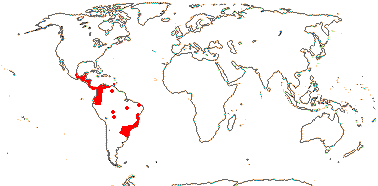Anomochlooideae
Basal lineages. -- The early history of the use of molecular techniques to investigate grass phylogeny is well documented (summary in Simon, 2007b). Prior to this work (Stebbins 1956; Watson et al. 1985; Clayton & Renvoize 1986; Watson & Dallwitz 1992) the subfamily Bambusoideae was circumscribed to either include or it was placed near to some genera that are today conventionally called “basal lineages” of the Poaceae; they include three small subfamilies Anomochlooideae (Anomochloa Brongn. and Steptochaeta Schrad. ex Nees), Puelioideae (Guaduella Franch. and Puelia Franch.) and Pharoideae (Pharus P.Browne, Leptaspis R.Br. and Scrotochloa Judz. ).
When this group of three subfamilies was first investigated, together with a wide sampling of the whole family (Clark et al 1995), it became clear that they were phylogenetically basal to all other grasses, even though no morphological synapomorphies were detected. This was followed by a formal recognition of the subfamily Anomochlooideae, with the tribes Anomochloeae and Streptochaeteae, and the subfamily Pharoideae (Clark & Judziewicz 1996); later, when the genera Puelia and Guaduella were added to the analysis and found to form a separate basal clade from the other two subfamilies, they were formerly described as subfamily Puelioideae (Clark et al. 2000).

Anomochloa
Streptochaeta
